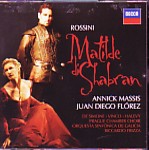Rossini’s Matilde di Shabran first appeared at Rome’s Apollo theatre on February 24, 1821, about 10 weeks after his Maometto II debuted in Naples. As usual, working against time, Rossini borrowed from a couple of his earlier operas: the overture is from Eduardo e Cristina; a tenor aria from Ricciardo e Zoraide was popped into the second act; a march from La donna del Lago shows up at one point. Unusually, Rossini also enlisted the aid of Giovanni Pacini to compose three numbers–and possibly the recitatives. Despite the presence of no less a figure than Niccolo Paganini on the podium (the original conductor having died of a stroke during rehearsals), the opera’s reception was mixed, and fist fights between the composer’s fans and detractors broke out in the streets after the performance.
Later that year, for Naples, Rossini transposed a second-act bass aria to the contralto range for the character of Edoardo (a trouser role), eliminated the borrowings from Ricciardo as well as Pacini’s offerings, and removed a duet for Edoardo and Matilde. It is this version that is presented here.
The plot, which takes place in Spain in the Middle Ages, involves Corradino (tenor), a militaristic, domineering, hypochondriacal, misogynistic Lord (who refers to himself as “heart of iron”), whose doctor, the bass Aliprando, convinces his (Corradino’s) ward Matilde (soprano) that she can change Corradino and make him love her in order to dispel his bad temper. Corradino falls for her but then a Countess with designs on Corradino falsely links Edoardo (mezzo), a perfectly fine lad who has been imprisoned by Corradino for being the son of his archenemy Raimondo (bass), in a love affair with Matilde.
Corradino, jealous and enraged, sentences Matilde to be flung from a cliff at the hands of the crackpot court poet, Isidoro (baritone), who reports her (false) execution so vividly that when Corradino hears of Matilde’s innocence, he feels remorseful and realizes his love for Matilde, who of course is still alive, allowing the opera to end happily.
This is certainly one of Rossini’s most stylistically confusing operas. Not only is it in the semi-seria vein (as in La Gazza Ladra), with buffa characters and tragic overtones, but Corradino has no aria (he makes himself the center of several distended ensembles) and Matilde has to wait for the finale for hers. Witty patter arias and duets show up left and right; about a half hour of the three-hour-plus opera is recitative. But some of the music–enough of it, in fact–is Rossini at his best: I would not want to do without the first-act quartet for Corradino and three(!) basses, that act’s octet finale, Edoardo’s second-act cavatina with horn obbligato, or a deliciously florid sextet in Act 2.
A 1974 performance of this opera (in a very different version) from Genoa circulated privately on LPs for years; the sound and performances are pretty messy. Another performance recorded live at Wildbad (on Bongiovanni) has great energy, and some of the singing is very good; many recitatives are cut, as is some of the music. Never mind, though: this new performance, taped at the Pesaro Festival in 2004 (with an incredibly quiet audience), is all you’ll ever need.
For starters, this is an ensemble opera and the Pesaro Festiva is known for its generous rehearsal time, so conductor Riccardo Frizza gets remarkable accuracy from the singers and players. In an opera in which there are an involved, echt-Rossinian quartet, quintet, sextet, and octet, there’s nary a note out of place; each works like clockwork, and with room for individual expression as well.
The individual singing is beyond praise. Juan Diego Florez lives up to his reputation as the finest Rossini tenor around, singing with bright tone and absolute accuracy in the fiendishly florid music, trouble-free with the many high Bs and Cs, and painting a portrait of the egocentric, angry Corradino that comes to life. Equally good is the alluring Annick Massis as Matilde. Coquettish, wickedly knowing, and thoroughly involved, she spins endless roulades with flair and grace. The trouser role of Edoardo is taken by a new mezzo named Hadar Halevy, and she impresses; the other mezzo role, the Countess, allows Chiara Chialli to show off her Katisha-like voice and temperament. Marco Vinco’s Aliprando is wise and fluent in coloratura, and Bruno de Simone presents an Isidoro of vivid character. The others are equally good. The sound is excellent, although Corradino is occasionally too closely miked. This is a necessity. [9/29/2006]
































